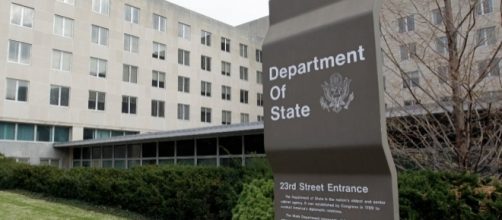Over the last week, the trump administration enacted an unprecedented "purge" of 46 prosecutors from the Department of Justice (DOJ) that has likely stalled pending investigations until replacements are found to handle them. The firings took place during a period where -- as Blasting News reported, the administration had yet fill close to two-thousand cabinet level positions, from top-level leadership down to those that don't need Senate confirmations.
At the same time, the State Department a.k.a "Foggy Bottom," is seen as being crippled by holding daily press briefings late, which didn't start up again until March 7 and not having a Deputy Secretary of State in place yet.
But since Secretary of State Rex Tillerson has been in his position, there has been very little indication that he is boldly presenting President Trump's policy views or that he even has any. According to one report by Foreign Policy called, "Rex Tillerson Might Be The Weakest Secretary Of State Ever," it explains just how silent Tillerson is. All of this comes up to even more news of a major rollback by the administration, that the same State Department will be cutting 50 percent of its funding to United Nations programs.
Tillerson given freedom to distribute cuts
The Trump administration puts the U.N. Human Rights Council on notice. @columlynch & @John_Hudson report https://t.co/hqJVOE1si0
— Foreign Policy (@ForeignPolicy) March 14, 2017
The same Foreign Policy media outlet reported that as recent as March 9, U.S.
diplomats had a closed-door meeting with key members of the U.N. telling them to "expect a big financial constraint" from the U.S. It's also mentioned that the White House will be releasing its budget proposal for 2018 on Thursday which is said to also make cuts to the State Department of up to 37 percent. Tillerson has reportedly proposed that cuts to the U.N. be phased over a period of three years but in the article about Tillerson mentioned earlier, he had already made at least one recommendation to the President for his deputy secretary which was rejected by the administration.
The report states that the cuts in the budget proposal will include The U.S. Agency for International Development (USAID) along with other foreign assistance programs, but it isn't known how deep those cuts will be.
The article says that the cuts will affect programs like UNICEF and the U.N. Development Programme. 36 percent of the cuts to humanitarian programs are also being considered which could refer to the World Food Programme and U.N. refugee operations no name a few.
Fulfilling promise to 'deconstruct the administrative state'
Bannon vows a daily fight for ‘deconstruction of the administrative state’https://t.co/xRijD7fpws
— Washington Post (@washingtonpost) February 24, 2017
Trump has already said that he wanted to deregulate the government. But at the recent CPAC event, President Trump's Chief Strategist Steve Bannon said that they intentionally want to deconstruct the administrative state. His explanation was that when progressive Leftists can't get something passed, they enable some form of regulation in an agency.
He said that the reason Trump selected his cabinet appointees was to deconstruct the system. With the latest pull-back on United Nations funding, thus far, they are keeping their promises. In an article by The New York Times titled "Stephen K. Bannon's CPAC Comments, Annotated and Explained" the article states that while Republicans have been anti-regulation, Bannon's position is that the Left operate a shadowy "administrative state" in order to advance their agenda.
But the article goes on to say that Bannon's view is that such an administrative state is hostile to the people and that this is not an uncommon view held by populist leaders -- such as those in the Trump White House. Bannon is said to be at the center of many of the executive orders that were first signed by Trump, which operated under a non-functioning cabinet, throwing much of the system into chaos which Bannon claims are not by mistake.
He has often touted himself as a dangerous opponent to the state. But the article also says that even though populists claim they are against the administrative state, when they gain power, they generally claim administrative power for themselves.

